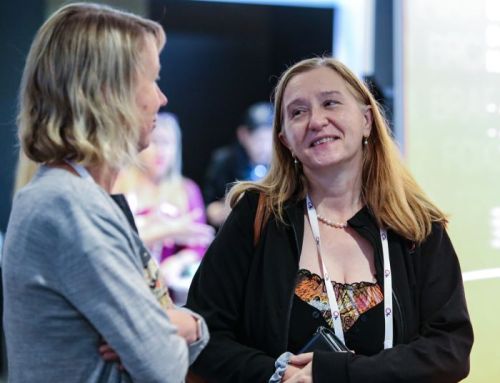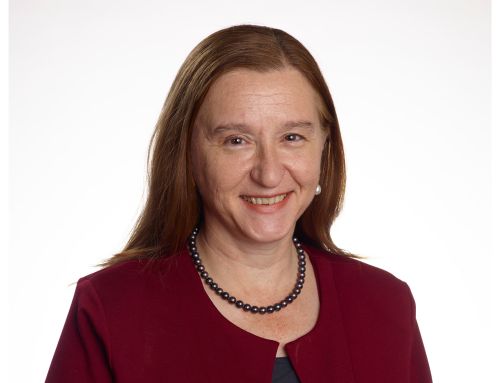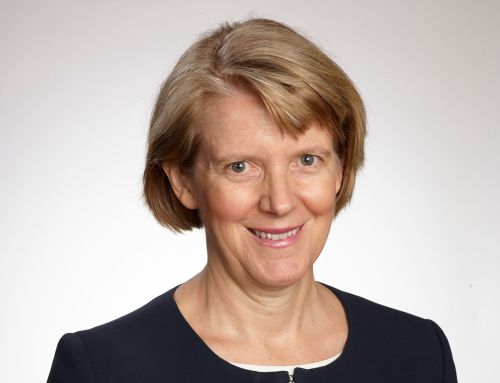During Ovarian Cancer Awareness Month, survivor and active ANZGOG member Wanda Lawson speaks about diagnosis, cancer treatments, and the importance of clinical trial research. Wanda is the chair of the Consumer Research Panel at ANZGOG.
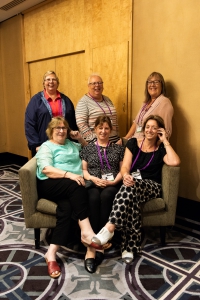
The Consumer Research Panel (CRP) at ANZGOG’s 2019 Annual Scientific Meeting.
16 years ago, in the week of my 45th birthday, I was diagnosed with ovarian cancer. Ovarian cancer is a tough disease, its outcomes are complicated, because the disease is often diagnosed late and composed of several subtypes with distinct biological and molecular properties. Current treatment, as with my own, still relies on upfront surgery (known as debulking), in my case a total and radical hysterectomy, and platinum-based chemotherapy (mine began 5 days after my surgery and continued for the next 6 months.) In the 16 years since survival rates remain at only 46% 5 years after diagnosis. I was caught early by a vigilant GP, operated on by an excellent gynaecological oncological surgeon and have since taken ongoing action myself (lots of exercise) all of which I believe have contributed to my continued wellbeing. Sadly, I know many women diagnosed at the same time, or even after me, who have not been so fortunate.
Findings have shown us that a “one size fits all” approach does not work in the treatment of ovarian cancer.
It’s not all bad news, there have been advances. To mention a few: major improvements have been made in maintenance therapies, the identification and targeting of PARP molecules involved in DNA repair and advances in efficacy are now being seen with the addition of targeted therapy to chemotherapy. These improving outcomes have been brought about through clinical trial practice. Findings have shown us that a “one size fits all” approach does not work in the treatment of ovarian cancer. I strongly believe that it is our continued support, at ANZGOG, of clinical trials that will ultimately make a difference to women affected by this cancer. Perhaps by eventually finding a screening test, or perhaps by developing our understanding of how precisely we treat newly diagnosed patients. We know that so far all our improvements to date in the outcomes of women diagnosed with ovarian cancer have been made on the back of clinical trials.
We know that so far all our improvements to date in the outcomes of women diagnosed with ovarian cancer have been made on the back of clinical trials.
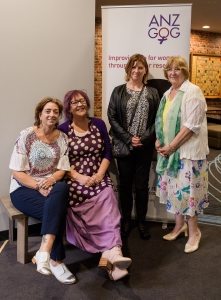
Engaging women in research: CRP at ANZGOG’s annual Research Development Day in 2019.
But what about those of us living post a diagnosis? Clinical trials don’t only look at cures, treatment and diagnosis, they also look at Quality of life (QOL). I was lucky enough to participate in one of these QOL trials 16 years ago. For me cancer is a long-term diagnosis. I have been well for 16 years, but cancer has had an impact on my health and my own ongoing quality of life. Cancer has not defined me – but it has touched many aspects of mine (and my husbands’) life ; economics, ongoing healthcare and surveillance, sexuality and sexual needs, the risk of having other health problems as a result of my cancer or its treatment – to name but a few.
Early evidence gathered as part of QOL trials showed that many cancer survivors have unmet needs particularly at the end of treatment, whilst others are struggling with consequences of treatment that could be either avoided or managed. Because of this information possible models for providing that support have been piloted. This is great, direct feedback by women, within a clinical trial is being translated into improvements. More recently clinical trials have been undertaken utilising Patient Reported Outcomes (PROs). These reflect how patients feel and function and are measured through questionnaires. PROs can be collected through the internet, automated telephone systems or downloadable apps. Multiple studies have tested whether it is feasible to integrate PROs into routine cancer care (it is) and whether outcomes are improved as a result (they are).
As an early advocate for women’s rights (back in the 70’s) I am passionate about taking action to improve outcomes. I believe that it is through our continued support and implementation of gynaecological clinical trials that we will learn what the right action to take is.
Wanda Lawson
Chair | Consumer Research Panel, ANZGOG


